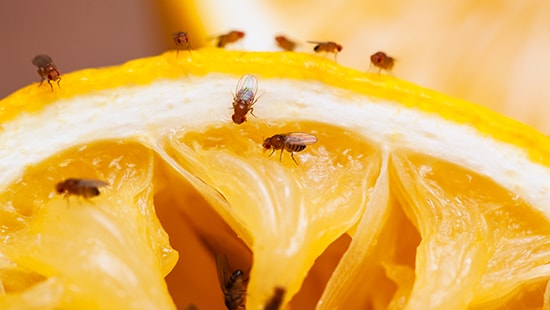Fruit Flies and Food Safety

Although the fruit fly (one of the many types of small flies) has historically been considered a nuisance pest, recent research proves that fruit flies contaminate food with bacteria carried from unsanitary surfaces. This puts restaurants and food retail businesses at risk if they don't have a fly control programme in place.
Small flies feed and breed in decaying and bacteria-ridden areas. They then land on food and food-contact surfaces where they can transmit foodborne bacteria and ultimately spread different types of foodborne illness. This puts restaurants at financial risk—health departments can require a shutdown due to fruit fly infestations.
What starts as a small problem can quickly overrun your operation. Small flies lay up to 100 eggs per day and can develop into reproductive adults in as little as 7 days. Each species of small fly can indicate unique sanitation problems. From Ecolab Senior Entomologist Morgan Manderfield: “The presence of fruit flies can signify issues such as rotting produce, dirty drains, or sanitation issues around beverage stations and other equipment, whereas a phorid fly infestation is often indicative of garbage, dirty drains, stagnant water, or sub-slab sewer line breakage. Moth flies will result from sanitation issues in drains, filters, and sewers,” Manderfield explained. “But” she added, “Regardless of what species of fly you have in your facility, it is a food safety concern indicative of sanitation and/or structural issues which could lead to audit or inspection failures as well as poor customer experiences that create a negative economic impact on your business.”
Facts About Small Flies
Depending on the types of flies that are present, different actions may be required for treatment and elimination. Understanding some of the more common types of small flies and their preferred breeding sites can help with fly prevention in your facility.
Common Types of Small Flies

Fruit/Vinegar Fly
- Adult is about 3-4 mm long, dull tan to brownish yellow or brownish black in colour with slight to bright red eyes.
- Breeding sites include: Unrinsed bottles and cans, indoor and outdoor trash receptacles, used mops and rags, beverage dispensers, open foods, standing water, floor mats, drains, garbage disposals, damp laundry (e.g., linens)
- Commonly infests fruits, vegetables, and fermenting liquids such as beer, cider, vinegar and wine.

Moth/Drain/
Filter/Sewage Fly
- It is 1.5-5 mm long and colour ranges from pale yellow to brownish gray to blackish.
- Adult has a delicate, fuzzy appearance (resembling a small moth) and flies only short distances, then crawls on surfaces.
- Breeds indoors and outdoors on gelatinous bacterial film of drains, filters, sewers, lift stations, pits and sump pumps.

Phorid/Humpbacked/
Scuttle Flies
- Adult is 0.5-5.5 mm long and is black, brown or yellowish in colour.
- Has a humpbacked profile and erratic movements, particularly when running.
- Breeds indoors and outdoors in moist, decaying matter; may be a sign of a plumbing/structural problem or sanitation issue such as dirty drains, stagnant water, dirty moist mop heads, or below-slab sewer line breakage.
Fly Control and Prevention
Since small flies are an indicator of a sanitation or structural problem within your facility, removal of the breeding source is the only permanent means of avoiding an infestation. Following simple sanitation and structural recommendations can make a big difference in avoiding a fruit fly infestation.



